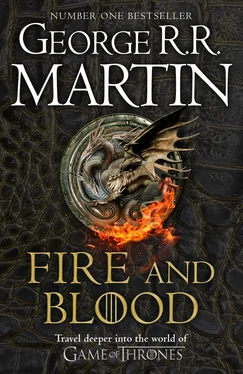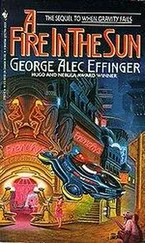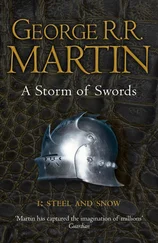The Lord of Storm’s End wanted time. Angry at the disrespect he felt the king had shown him and unaccustomed to defeat, Rogar Baratheon remained determined to find a way to part Jaehaerys and Alysanne. So long as their marriage remained unconsummated, he believed, a chance remained. Best then to keep the wedding secret, so it might be undone without anyone being the wiser.
Queen Alyssa wanted time as well, though for a different reason. What is done is done, she had said at the gates of Dragonstone, and so she believed … but memories of the bloodshed and chaos that had greeted the marriage of her other son and daughter still haunted her nights, and the Queen Regent was desperate to find some way to ascertain that history would not be repeated.
Meanwhile, she and her lord husband still had a realm to rule for the best part of a year, until Jaehaerys attained his sixteenth nameday and took the power into his own hands.
And so matters stood in Westeros as the Year of the Three Brides drew to an end, and gave way to a new year, the 50th since Aegon’s Conquest.
A Surfeit of Rulers A Surfeit of Rulers A Time of Testing—The Realm Remade Birth, Death, and Betrayal Under King Jaehaerys I Jaehaerys and Alysanne—Their Triumphs and Tragedies The Long Reign—Jaehaerys and Alysanne: Policy, Progeny, and Pain Heirs of the Dragon—A Question of Succession The Dying of the Dragons—The Blacks and the Greens The Dying of the Dragons—A Son for a Son The Dying of the Dragons—The Red Dragon and the Gold The Dying of the Dragons—Rhaenyra Triumphant The Dying of the Dragons—Rhaenyra Overthrown The Dying of the Dragons—The Short, Sad Reign of Aegon II Aftermath—The Hour of the Wolf Under the Regents—The Hooded Hand Under the Regents—War and Peace and Cattle Shows Under the Regents—The Voyage of Alyn Oakenfist The Lysene Spring and the End of Regency Lineages and Family Tree A Conversation Between George R.R. Martin and Dan Jones Footnotes About the Author About the Illustrator By George R.R. Martin About the Publisher
All men are sinners, the Fathers of the Faith teach us.
Even the noblest of kings and the most chivalrous of knights may find themselves overcome by rage and lust and envy, and commit acts that shame them and tarnish their good names. And the vilest of men and the wickedest of women likewise may do good from time to time, for love and compassion and pity may be found in even the blackest of hearts. “We are as the gods made us,” wrote Septon Barth, the wisest man ever to serve as the Hand of the King, “strong and weak, good and bad, cruel and kind, heroic and selfish. Know that if you would rule over the kingdoms of men.”
Seldom was the truth of his words seen as clearly as during the 50th year after Aegon’s Conquest. As the new year dawned, all across the realm plans were being made to mark a half century of Targaryen rule over Westeros with feasts, fairs, and tourneys. The horrors of King Maegor’s rule were receding into the past, the Iron Throne and the Faith were reconciled, and the young King Jaehaerys I was the darling of smallfolk and great lords alike from Oldtown to the Wall. Yet unbeknownst to all but a few, storm clouds were gathering on the horizon, and faintly in the distance wise men could hear a rumble of thunder.
A realm with two kings is like a man with two heads, the smallfolk are wont to say. In 50 AC, the realm of Westeros found itself blessed with one king, a Hand, and three queens, as in King Maegor’s day … but whereas Maegor’s queens had been consorts, subservient to his will, living and dying at his whim, each of the queens of the half-century was a power in her own right.
In the Red Keep of King’s Landing sat the Queen Regent Alyssa, widow of the late King Aenys, mother to his son Jaehaerys, and wife to the King’s Hand, Rogar Baratheon. Just across Blackwater Bay on Dragonstone, a younger queen had arisen when Alyssa’s daughter Alysanne, a maid of thirteen years, had pledged her troth to her brother King Jaehaerys, against the wishes of her mother and her mother’s lord husband. And far to the west on Fair Isle, with the whole width of Westeros separating her from both mother and sister, was Alyssa’s eldest daughter, the dragonrider Rhaena Targaryen, widow of Prince Aegon the Uncrowned. In the westerlands, riverlands, and parts of the Reach, men were already calling her the Queen in the West.
Two sisters and a mother, the three queens were bound by blood and grief and suffering … and yet between them lay shadows old and new, growing darker by the day. The amity and unity of purpose that had enabled Jaehaerys, his sisters, and their mother to topple Maegor the Cruel had begun to fray, as long-simmering resentments and divisions made themselves felt. For the remainder of the regency the boy king and his little queen would find themselves deeply at odds with the King’s Hand and the Queen Regent, in a rivalry that would continue into Jaehaerys’s own reign and threaten to plunge the Seven Kingdoms back into war.[1]
The immediate cause of the tension was the king’s sudden and secret marriage to his sister, which had taken the Hand and the Queen Regent unawares and thrown their own plans and schemes into disarray. It would be a mistake to believe that was the sole cause of the estrangement, however; the other weddings that had made 49 AC the Year of the Three Brides had also left scars.
Lord Rogar had never asked Jaehaerys for leave to wed his mother, an omission the boy king took for a sign of disrespect. Moreover, His Grace did not approve of the match; as he would later confess to Septon Barth, he valued Lord Rogar as a counselor and friend, but he did not need a second father, and thought his own judgment, temperament, and intelligence to be superior to his Hand’s. Jaehaerys also felt he should have been consulted about his sister Rhaena’s marriage, though he felt that slight less keenly. Queen Alyssa, for her part, was deeply hurt that she had neither been advised of nor invited to Rhaena’s wedding on Fair Isle.
Away in the west, Rhaena Targaryen nursed her own grievances. As she confided to the old friends and favorites she had gathered around her, Queen Rhaena neither understood nor shared her mother’s affection for Rogar Baratheon. Though she honored him grudgingly for rising in support of her brother Jaehaerys against their uncle Maegor, his inaction when her own husband, Prince Aegon, faced Maegor in the Battle Beneath the Gods Eye was something she could neither forget nor forgive. Also, with the passage of time Queen Rhaena grew ever more resentful that her own claim to the Iron Throne, and that of her daughters, had been disregarded in favor of that of “my baby brother” (as she was wont to call Jaehaerys). She was the firstborn, she reminded those who would listen, and had been a dragonrider before any of her siblings, yet all of them and “even my own mother” had conspired to pass her over.
Looking back now with the benefit of hindsight, it is easy to say that Jaehaerys and Alysanne had the right of it in the conflicts that arose during the last year of their mother’s regency, and to cast Queen Alyssa and Lord Rogar as villains. That is how the singers tell the tale, certainly; the swift and sudden marriage of Jaehaerys and Alysanne was a romance unequaled since the days of Florian the Fool and his Jonquil, to hear them sing of it. And in songs, as ever, love conquers all. The truth, we submit, is a deal less simple. Queen Alyssa’s misgivings about the match grew out of genuine concern for her children, the Targaryen dynasty, and the realm as a whole. Nor were her fears without foundation.
Lord Rogar Baratheon’s motives were less selfless. A proud man, he had been stunned and angered by the “ingratitude” of the boy king he had regarded as a son, and humiliated when forced to back down at the gates of Dragonstone before half a hundred of his men. A warrior to the bone, Rogar had once dreamed of facing Maegor the Cruel in single combat, and could not stomach being shamed by a lad of fifteen years. Lest we think too harshly of him, however, we would do well to remember Septon Barth’s words. Though he would do some cruel, foolish, and evil things during his last year as Hand, he was not a cruel or evil man at heart, nor even a fool; he had been a hero once, and we must remember that even as we look at the darkest year of his life.
Читать дальше












